
Scientific African
Scope & Guideline
Innovating Research, Elevating Africa
Introduction
Aims and Scopes
- Environmental Science and Sustainability:
Research in this area focuses on understanding environmental challenges, resource management, and sustainable practices, particularly in the context of climate change and its impact on ecosystems and communities across Africa. - Health Sciences and Biomedicine:
This scope addresses public health issues, disease prevention, and the development of therapeutic strategies relevant to African populations, including studies on infectious diseases, nutrition, and the use of traditional medicine. - Agricultural and Food Sciences:
Research related to agricultural practices, food security, and the nutritional quality of food resources is a key focus, with studies examining crop production, livestock management, and the impact of climate on agriculture. - Engineering and Technology:
This area encompasses innovations in engineering, renewable energy technologies, and the application of advanced materials and processes to solve practical problems faced by communities, promoting technological advancement in Africa. - Social Sciences and Economics:
Research in this scope analyzes socio-economic factors influencing development, including the impact of policies on local communities, food systems, and the interplay between culture and technology. - Natural Products and Medicinal Chemistry:
This includes studies on the bioactivity of natural products, their potential therapeutic applications, and the exploration of indigenous plants for drug discovery, focusing on enhancing healthcare outcomes.
Trending and Emerging
- Climate Change and Adaptation Strategies:
There has been an increase in research addressing climate change, its impacts on various sectors, and strategies for adaptation, emphasizing the urgency of sustainable practices in agriculture and resource management. - Digital Health and Telemedicine:
The COVID-19 pandemic has accelerated interest in digital health solutions, including telemedicine, remote patient monitoring, and the use of technology in healthcare delivery, highlighting the importance of accessibility and innovation. - Renewable Energy and Sustainability Innovations:
Research focused on renewable energy sources, energy efficiency, and innovative technologies for sustainable development is gaining traction, reflecting a global shift towards cleaner energy solutions. - Food Security and Nutritional Health:
Emerging studies emphasize integrated approaches to enhance food security, nutritional health, and the resilience of food systems, particularly in the context of economic disruptions caused by the pandemic. - Artificial Intelligence and Data Science Applications:
There is a growing trend in applying artificial intelligence and data science techniques to various fields, including healthcare, agriculture, and environmental monitoring, demonstrating the potential for advanced analytics in addressing complex challenges. - Antimicrobial Resistance and Public Health:
Research investigating antimicrobial resistance, its implications for public health, and the development of new therapeutic agents is increasingly prioritized, reflecting global health concerns.
Declining or Waning
- Traditional Agricultural Practices:
Research specifically focused on traditional agricultural methods appears to be declining, as there is a growing emphasis on modern techniques and sustainable practices that integrate technology and innovation. - Basic Environmental Monitoring:
There seems to be a waning interest in studies that solely focus on basic environmental monitoring without actionable insights or technology integration, as researchers increasingly seek to link findings to practical applications. - Localised Ethnobotanical Studies:
While ethnobotany remains important, the focus on localized studies without broader implications or interdisciplinary approaches may be diminishing in favor of studies that connect traditional knowledge with modern scientific methodologies.
Similar Journals

Agricultura Sociedad y Desarrollo
Innovating Solutions at the Intersection of Agriculture and CommunityAgricultura Sociedad y Desarrollo is a renowned journal published by COLEGIO POSTGRADUADOS, focusing on the intricate relationship between agriculture, society, and sustainable development. With an ISSN of 1870-5472 and an E-ISSN of 2594-0244, this journal plays a critical role in disseminating cutting-edge research and practical insights essential for advancing agricultural sciences and fostering community resilience. Although Agricultura Sociedad y Desarrollo is not open access, its commitment to quality ensures that the materials published meet rigorous academic standards, promoting innovation and collaboration among researchers, policymakers, and practitioners. Positioned in the heart of Mexico, the journal highlights regional agricultural challenges while contributing to global discussions on sustainable development. With the growing emphasis on integrating social sciences in agriculture, this journal stands out as a vital source of knowledge and discussion for those keen on enhancing agricultural practices and societal development.
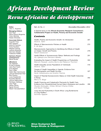
AFRICAN DEVELOPMENT REVIEW-REVUE AFRICAINE DE DEVELOPPEMENT
Empowering Sustainable Futures in AfricaAFRICAN DEVELOPMENT REVIEW - REVUE AFRICAINE DE DEVELOPPEMENT is a premier academic journal dedicated to the field of development studies, published by Wiley. With a focus on the complex dynamics of sustainable development on the African continent, this journal aims to disseminate high-quality research that informs policy and scholarly discourse. Established in 1989, it has consistently maintained its reputation, ranking in the Q1 category for development in 2023, and achieving an impressive 85th percentile rank in the Scopus Social Sciences category. Although it does not currently offer open access, the journal provides a vital platform for researchers, practitioners, and students to explore innovative ideas and interventions aimed at addressing Africa's development challenges. The journal's ISSN is 1017-6772 and its E-ISSN is 1467-8268, reflecting its commitment to providing a scholarly outlet for rigorous analysis and dialogue. For the latest insights and developments, the AFRICAN DEVELOPMENT REVIEW remains an essential resource, fostering a deeper understanding of the trajectories shaping African nations into the future.

Kuwait Journal of Science
Elevating Research Standards in the Heart of KuwaitKuwait Journal of Science, published by ELSEVIER, is a prominent open-access journal that has been disseminating high-quality research since 2013. With a focus on multidisciplinary fields, the journal ranks in the Q2 category and holds a commendable position as #63 out of 171 in the Scopus Multidisciplinary rankings, placing it at the 63rd percentile. This journal serves as a vital platform for researchers, professionals, and students interested in cutting-edge scientific advancements and discoveries. The open-access model ensures that a wider audience can access and benefit from the research published, fostering collaboration and innovation across various disciplines. Based in Kuwait and backed by the reputable publisher ELSEVIER, the Kuwait Journal of Science aims to contribute significantly to the global scientific community by providing a space for impactful research findings and interdisciplinary dialogue.
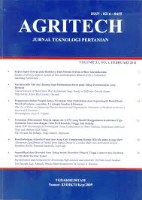
Agritech
Transforming Agriculture with Cutting-Edge InsightsAgritech is a prominent open-access journal dedicated to advancing the field of agricultural technology. Published by UNIV GADJAH MADA, FAC AGRICULTURAL TECHNOLOGY, this esteemed journal disseminates innovative research and cutting-edge practices that contribute significantly to sustainable agriculture, precision farming, and environmental stewardship. Launched in 1999, Agritech has established itself as a vital resource for researchers, professionals, and students alike, providing a platform for the exchange of ideas and findings that shape the future of agricultural technology. By embracing an open-access model, the journal ensures that high-quality research is accessible to a global audience, promoting collaboration and knowledge sharing in the agricultural community. With an ISSN of 0216-0455 and an E-ISSN of 2527-3825, Agritech remains committed to enriching agricultural practices and policies through rigorous scientific inquiry and innovation.
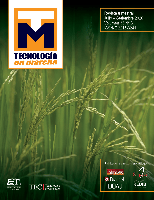
Tecnologia en Marcha
Fostering Collaboration for a Technological TomorrowTecnologia en Marcha is a premier academic journal published by the Instituto Tecnológico de Costa Rica, catering to the fields of engineering, technology, and applied sciences. With its open access model established since 1999, the journal ensures that cutting-edge research is readily accessible to scholars and practitioners alike, promoting innovation and collaboration across various domains. ISSN: 0379-3982 and E-ISSN: 2215-3241 exemplify its commitment to global dissemination of knowledge. The journal aims to publish high-quality empirical and theoretical studies that contribute to technological advancements and educational practices, fostering an environment where interdisciplinary research can flourish. By providing a platform for researchers, professionals, and students from diverse backgrounds, Tecnologia en Marcha plays a vital role in shaping the future of technology and engineering in Latin America and beyond.
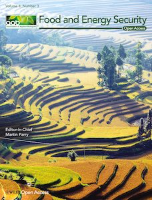
Food and Energy Security
Unlocking New Pathways for Sustainable Food and Energy PracticesFood and Energy Security, an esteemed journal published by WILEY, is dedicated to advancing the fields of food science, agriculture, and renewable energy. Since its inception in 2012, this open-access journal has provided a platform for groundbreaking research and innovative practices that address global challenges related to food production and energy sustainability. With an impressive impact factor reflected in its Q1 quartile rankings across notable categories such as Agronomy and Crop Science and Food Science, this journal is instrumental for researchers and practitioners alike who are focused on enhancing food security and promoting sustainable energy solutions. The journal's scope encompasses multidisciplinary approaches and encourages submissions that explore the intersection of food systems and energy dynamics, ensuring relevance in the evolving landscape of environmental science and policy. By offering open access to its publications, Food and Energy Security commits to making vital research accessible, fostering informed dialogue and collaboration among scholars, policymakers, and the agrifood industry worldwide.

JOURNAL OF THE NATIONAL SCIENCE FOUNDATION OF SRI LANKA
Exploring the Frontiers of Scientific ResearchJOURNAL OF THE NATIONAL SCIENCE FOUNDATION OF SRI LANKA, with ISSN 1391-4588 and E-ISSN 2362-0161, is a respected academic publication disseminated by the National Science Foundation of Sri Lanka. Operating since 1999, this journal encompasses a broad spectrum of multidisciplinary research, currently positioned in the Q3 category and ranking #101 out of 171 in its field, indicating its significant contribution to advancing knowledge across various scientific domains. With an ambition to foster local and international scholarly dialogue, the journal encourages submissions that address fundamental and applied aspects of science pertinent to Sri Lanka and beyond. Though it operates under a conventional access model, the journal is committed to promoting high-quality, peer-reviewed articles that are vital for researchers, professionals, and students aiming to stay at the forefront of scientific advancements in the region.
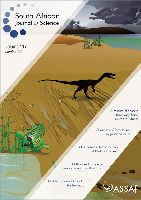
SOUTH AFRICAN JOURNAL OF SCIENCE
Unlocking Knowledge, Enriching LivesThe SOUTH AFRICAN JOURNAL OF SCIENCE, published by the Academy of Science of South Africa (ASSAf), is a prestigious open-access journal dedicated to the advancement and dissemination of scientific knowledge across various disciplines. Since its inception in 1973, the journal has played a pivotal role in fostering scientific communication within South Africa and beyond, ranking in the Q2 and Q3 quartiles across critical categories such as Agricultural and Biological Sciences, Biochemistry, Genetics and Molecular Biology, and Earth and Planetary Sciences as of 2023. With an ISSN of 0038-2353 and E-ISSN 1996-7489, this journal embraces modern publishing practices, having adopted an open-access model in 2009, which ensures that research is readily accessible to a global audience. The journal aims to promote interdisciplinary research and facilitate collaboration among scientists, making it an essential resource for researchers, professionals, and students eager to contribute to and learn from the dynamic landscape of scientific inquiry. For further information, collaborators and correspondents may reach out to the journal through its contact address: PO BOX 72135, LYNWOOD RIDGE 0040, SOUTH AFRICA.
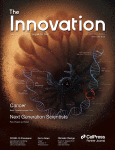
Innovation
Fostering Excellence in Innovative ResearchInnovation is an esteemed open-access journal published by CELL PRESS that has emerged as a leading platform for multidisciplinary research since its inception in 2020. With an impressive Scopus rank of #3 out of 171 in the multidisciplinary category and a notable impact factor placing it in the 98th percentile, the journal has quickly established itself as a crucial resource for researchers and professionals seeking to disseminate groundbreaking ideas and developments across various fields. Located in the United States, at 50 Hampshire St, Floor 5, Cambridge, MA, Innovation aims to foster collaboration and innovation by providing unrestricted access to advanced research. Its commitment to excellence is reflected in its categorization as Q1 in 2023, indicating its high citation and influence within the academic community. The journal invites submissions that push the boundaries of knowledge and encourages scholarly discourse, making it an indispensable resource for students, researchers, and practitioners committed to making impactful contributions to their respective fields.

National Science Review
Driving collaboration across disciplines for impactful solutions.National Science Review, published by Oxford University Press, stands as a premier open-access journal dedicated to advancing the frontiers of multidisciplinary scientific research. With an impressive impact factor reflective of its high citation rates and a Q1 ranking within its category as of 2023, it ranks #5 out of 171 journals in its field, placing it in the 97th percentile of Scopus' multidisciplinary rankings. Since its inception in 2014, the journal has evolved into a pivotal platform for the dissemination of innovative findings across various scientific disciplines, attracting contributions from leading researchers globally. Accessible to both academics and professionals alike since its transition to open access in 2020, the journal not only promotes collaboration but also ensures the broad dissemination of knowledge critical for tackling pressing global challenges. Residing in the historic city of Oxford, United Kingdom, it continually seeks to contribute to the global conversation on scientific advancements and their implications for society, making it an indispensable resource for anyone at the intersection of science and innovation.